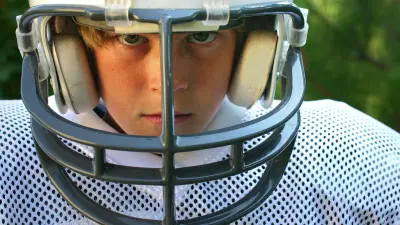“Let it be about your kid and not about you.” That single quote from University of Utah defensive coordinator Morgan Scalley perfectly sums up what every parent of a youth athlete needs to understand.
In this episode of the Today’s Mama Podcast, I sat down with Coach Scalley to talk parenting, youth athletes, college recruiting, and how we as moms and dads can better support our kids on and off the field. Whether you’re parenting a comp soccer player, a future D1 athlete, or a child just learning the ropes of team sports, this conversation is one every parent should listen to.
Youth Sports: It’s About the Kids

We’ve all seen it: the yelling parent on the sideline, the one berating the ref or criticizing a kid’s performance from across the field. I’ve watched ten-year-old girls cry after games because of what other parents were shouting at them. The pressure is real, and it’s not always coming from coaches.
Coach Scalley reminded us that sports are meant to build character and life skills. He shared stories from his own childhood, including one where his dad (who also played for the U of U) made a point not to give him special treatment as a coach. Instead, he let him face tough moments and grow from them.
“I think kids can learn so much about life by going through the process… even when the coach is playing his own kid over yours. That’s part of the deal.”
What College Coaches Are Actually Looking For
You might assume that college recruiters are only interested in talent. Not so. According to Scalley, what happens off the field is just as important as what happens on it.
Here are the top things coaches like Scalley are looking for when recruiting youth athletes:
- Academic discipline: GPA and class attendance are critical. “If you’re not going to class, you’re not going to play.”
- Coachability: How do players respond to feedback?
- Communication: Can a student-athlete advocate for themselves?
- Character: Coaches call teachers, counselors, and examine social media before offering a scholarship.
Scalley emphasized that every decision made during recruiting is part of a bigger picture. “You’re not just looking at a transcript. You’re looking at a young man’s story.”
Social Media and College Recruiting

Coaches aren’t just watching your kid play. They’re watching what they post.
“If you retweet it, you’re co-signing it.”
One simple social media post once cost a potential NFL draft pick millions. Scalley stressed that social media behavior can reveal a player’s mindset and maturity. It’s something every parent and teen needs to understand when supporting a youth athlete.
The Long Game vs. The Short Game
I shared with Coach Scalley my philosophy about parenting youth athletes: there’s a long game and a short game. The short game is about pushing for playing time now, smoothing over every problem, and managing your kid’s journey for them. The long game is harder. It’s about letting your kid fall down, take feedback, and figure out how to get back up.
“Eventually, your talent will shine through. The cream rises to the top.”
Coach Scalley agreed wholeheartedly. He’s seen kids walk on, work their way up, and earn scholarships because they stayed focused and didn’t rely on their parents to do the talking.
How Parents Can Support Their Youth Athlete the Right Way

Coach Scalley made it clear: he’ll never take a phone call from a parent about playing time. “That’s between me and the player,” he said. But if a parent wants to talk about a child’s academics, mental health, or general wellbeing? The door is always open.
For younger players, Scalley advised parents to look at the bigger picture. If the issue is about personal attacks, discrimination, or serious misconduct, it’s worth a conversation. But otherwise, he said:
“Volunteer. Become a coach. If you don’t like how things are run, get involved in a positive way.”
Resilience Over Recognition
At the heart of it all is one core truth: the best thing we can teach our kids through sports is how to handle adversity. Coach Scalley shared stories of players who didn’t start, who got benched, who had to ask, “What can I do to improve?” These are the kids who succeed.
He told the story of Cody Barton, a University of Utah player who didn’t see much playtime until his senior year. Barton worked hard, stayed humble, and asked his coaches how to get better. That year, he had a breakout season, earned a spot at the NFL Combine, and received the Pat Tillman Award for character and service.
Final Thoughts: You Can’t Play the Game For Them
This episode was a love letter to every sports parent trying to figure it out. It was a reminder that our job is to support our kids, not to live through them.
Let’s keep our perspective on the sidelines. Cheer for them. Love them. Let them take the lead. Because at the end of the day, youth sports are just a vehicle. What matters most is who they become in the process.
“Do the very best I know how, the very best I can, and I mean to keep on doing so until the end.” —Abraham Lincoln (quoted by Coach Scalley)








Leave a Reply